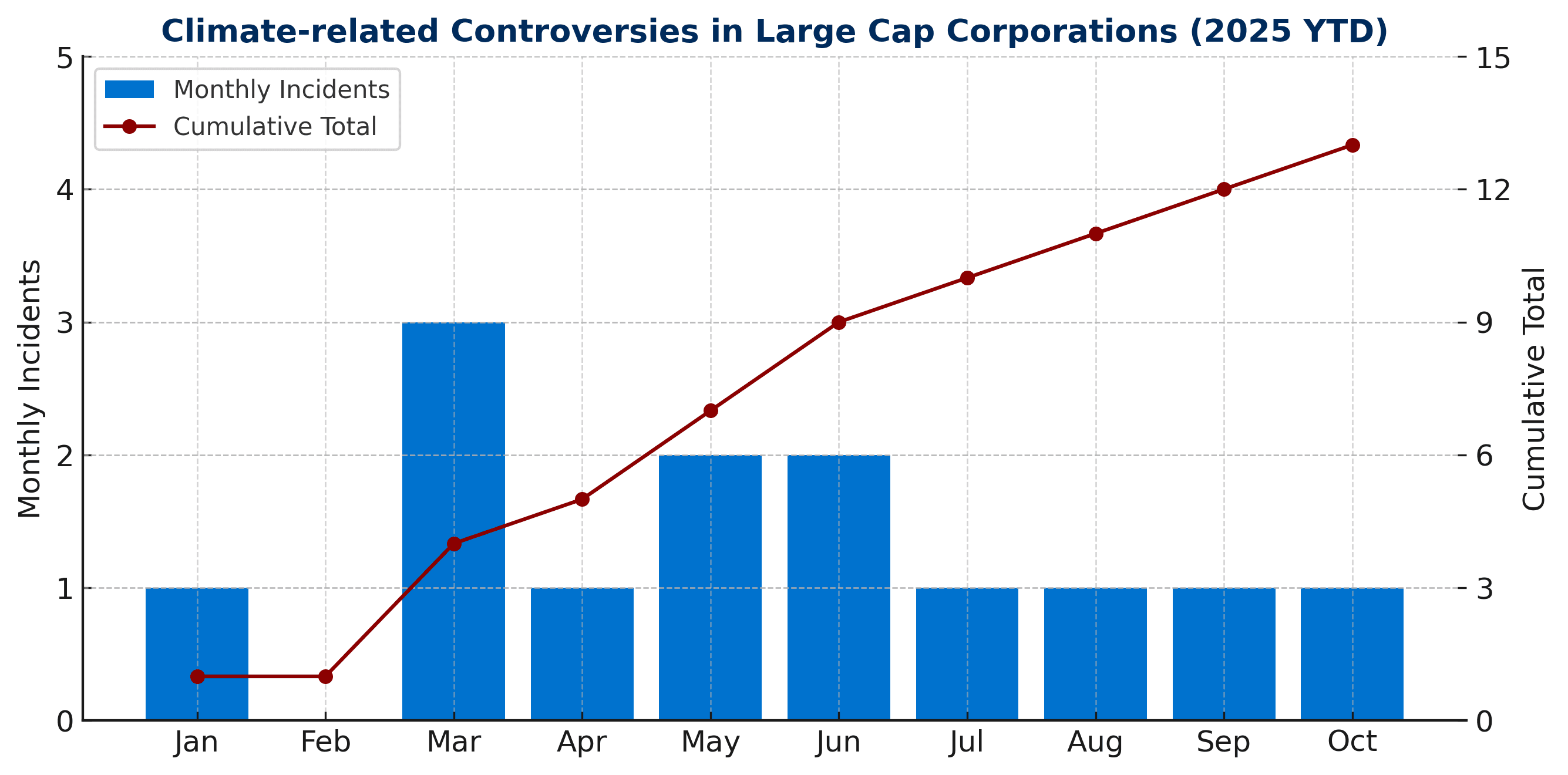

Shauna joined the BD team at Integrum ESG in 2021, having previously worked in similar roles within Fintech companies. She holds a BA in English and New Media Studies from the University of Limerick, Ireland.
Climate-related controversies are building financial pressure across global markets.
In 2025 so far, 13 major listed companies were flagged for incidents involving emissions fraud, greenwashing, disclosure failures and environmental non-compliance.
Together, these firms represent more than $1.99 trillion in combined market value, with an average market capitalisation of $153 billion.
Key Takeaways
• Thirteen major companies have faced controversies linked to climate or environmental issues so far in 2025 - fewer than other ESG risks but each carrying deep financial and reputational consequences
• The dominant themes are regulatory enforcement, litigation, greenwashing scrutiny and investor activism, underscoring climate risk as a governance and disclosure challenge
• Climate controversies unfold slowly through compliance and accountability channels but once they emerge, their valuation and trust impacts are long-lasting
Climate risk: fewer headlines, deeper impact
Using the Integrum ESG sentiment tracker, our team identified and catalogued climate-related controversies between January 1 and October 17 2025. Some key findings include:
• 13 companies during the period
• Combined market cap: $1,993,995,988,641
• Average market cap: $153,384,306,819

High-profile names flagged include Saudi Aramco, SMFG, Enbridge, RWE, Woodside Energy, Epiroc and more.
Climate risk continues to rise on the investor agenda - not through sudden market shocks but through enforcement, litigation and disclosure failures that reshape long-term value.
While climate controversies remain less frequent than other ESG risks - such as the 35 cybersecurity incidents recorded over the same period - their financial and reputational consequences often run far deeper.
The dominant themes in 2025
This year’s controversies point to environmental oversight tightening and governance standards being under closer scrutiny.
1) Regulatory enforcement and penalties
Authorities are linking environmental non-compliance directly to governance and disclosure failures. Hino Motors’ $1.6 billion emissions-fraud settlement and Stella-Jones' $1 million fine for environmental violations highlight the cost of poor oversight.
2) Community and operational risk
Operational lapses continue to test environmental management. GrainCorp faced a class action in Australia over factory emissions, while a gas leak at Oil India renewed scrutiny of risk controls in high-impact sectors.
3) Greenwashing and disclosure scrutiny
Greenwashing is no longer a marketing issue - it is a disclosure and accountability risk. Complaints against Enbridge and Cenovus, along with investor dissent at Woodside Energy, show that misrepresentation of climate credentials carries governance and financial consequences.
4) Governance and alignment
Strategic alignment remains a dividing line. Storebrand Asset Management for example divested from Toyota Motor Corporation - selling approximately $85 million in holdings - over anti-climate lobbying. Meanwhile SMFG’s withdrawal from the (now defunct) Net-Zero Banking Alliance underscored regional fragmentation in climate commitments.
Why this matters for investors
Although these climate-related controversies emerge gradually, they reinforce that environmental risk is a material part of long-term corporate and investment risk management.
For asset managers, hedge funds and institutional investors, this translates into:
• Compliance and capital cost
Environmental enforcement leads to higher remediation spend, delayed projects and thinner margins.
• Governance credibility
Emissions fraud and misreporting damage ESG ratings and investor confidence.
• Disclosure pressure
Regulatory frameworks such as EU SFDR, FCA TCFD and California SB 253+261 require credible, verifiable climate data.
• Market positioning
Companies that back climate commitments with verifiable data now attract stronger investor demand and lower capital costs.
The slow burn of environmental risk
More companies are embedding emissions targets, transition strategies and climate governance into corporate planning. That shift has reduced the frequency of major incidents - but it has also raised expectations.
Unlike cyber or conduct risks that trigger immediate disruption, climate controversies tend to unfold gradually through regulatory action, litigation and disclosure challenges. Their impact builds over time, increasing compliance costs, eroding trust and weighing on valuations across reporting cycles.
Each controversy flagged in 2025 revealed gaps in governance and oversight, highlighting how environmental performance is increasingly viewed as a measure of corporate accountability.
Staying ahead of climate controversy risk with credible data
At Integrum ESG, we equip investors with the data and intelligence needed to identify ESG controversies early.
Our Platform combines transparent, credible and auditable ESG analytics with a real-time ESG sentiment and controversies tracker. Powered by AI, it monitors over 47,000 news and social media sources to detect when sentiment around a company’s ESG performance is shifting.
By flagging governance, conduct and compliance risks before they escalate into full controversies, Integrum helps investors avoid exposure to reputational damage, regulatory penalties and value erosion across their portfolios.
ESG Intelligence which is fast, transparent and affordable - only on the Integrum Platform.

